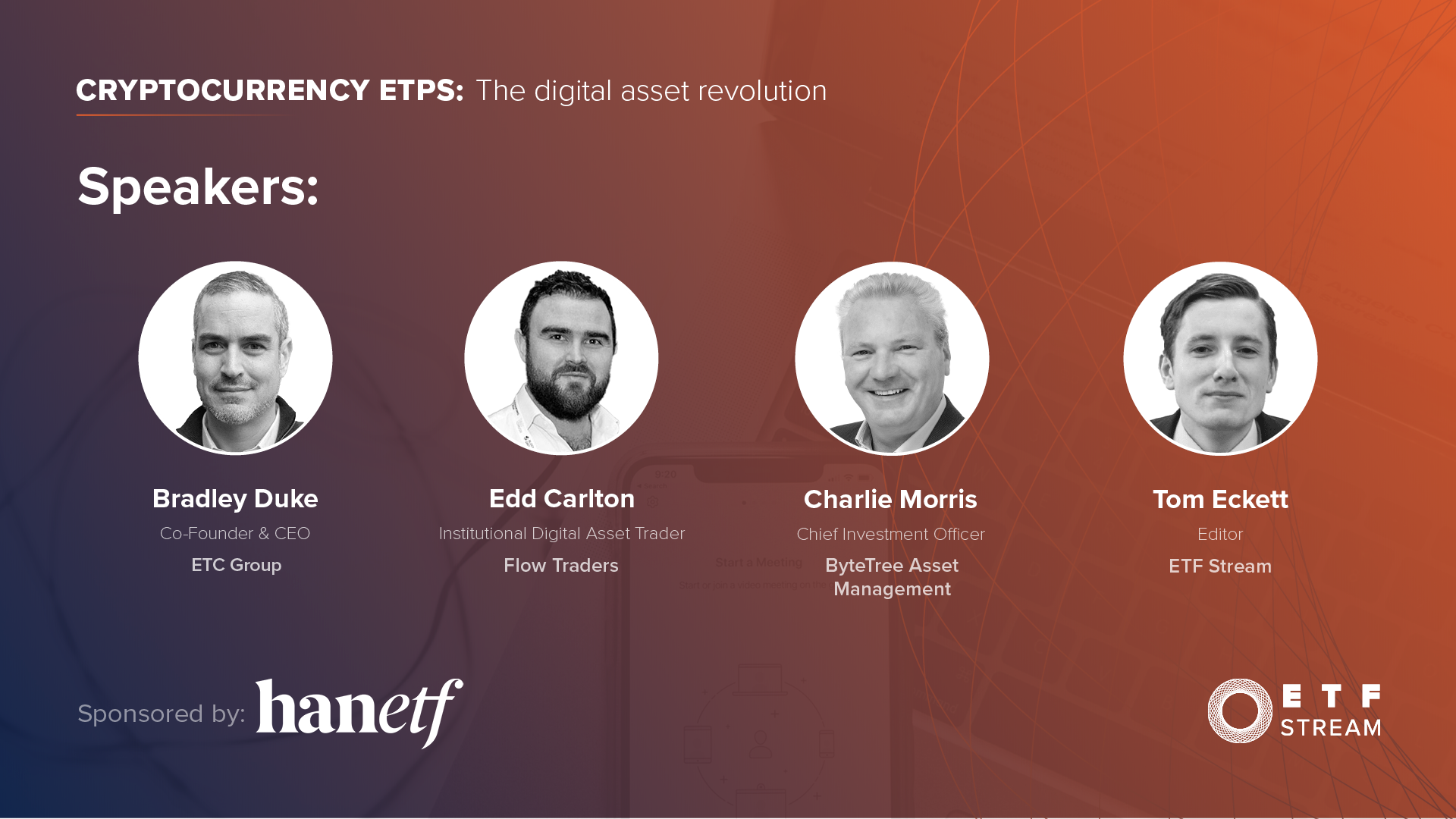The investment case behind crypto, the importance of the exchange-traded product (ETP) wrapper, regulation and environmental, social and governance (ESG) criticisms were all discussed at ETF Stream’s webinar on crypto ETPs.
The webinar, titled Cryptocurrency ETPs: The digital asset revolution, started by looking at the rapid adoption and expanding range of crypto products available to investors.
The pace of uptake in these strategies has quickened since the coronavirus pandemic. Through a mixture of investors seeking out non-correlated assets to hedge against volatility and the commencement of institutional involvement, many now argue crypto ETPs have gained a foothold in the investment mainstream.
Bradley Duke, co-founder and CEO at ETC Group, said this shift has been particularly pronounced over the past year, where the sector has gone from a community of supporters, to regularly making headlines across the globe with new developments each week.
Importantly, Duke said, digital assets did not just benefit from abnormal market conditions during the height of the pandemic but are increasingly being viewed as a store of value.
“Moving part of your portfolio into crypto, especially bitcoin, has been seen as a way of hedging against inflation,” Duke noted.
Edd Carlton, institutional digital asset trader at Flow Traders, added ETPs have aided their underlying asset class by providing the oversight and regulation offered by on-exchange trading and a deep OTC market supported by liquidity providers and regulated custodians.
In a similar vein, Charlie Morris, CIO at ByteTree Asset Management, continued: “Crypto trading used to be a toy train set version of the real thing but the infrastructure has greatly matured.”
Investment case
On concerns about cryptos lacking a tangible basis for their valuations, Morris pointed to Facebook’s purchase of WhatsApp for $18bn while the messaging service was generating no profit. In his view, the first challenge is gaining and maintaining people’s attention.
“It is the growth of the network, the number of people engaged in the space, that is here the value comes from in bitcoin,” Morris said.
Morris also noted bitcoin’s pseudonymous creator, Satoshi Nakamoto, was a gold bug – but said while their mutual scarcity gives them similar properties on the supply side, they differ greatly on the demand side.
For instance, bitcoin is favoured in risk-on environments and while bond yields are rising, and vice versa for gold, Morris said.
Duke went further, refuting the idea that cryptos lack tangible value by pointing to the business case for ethereum and the integral role it plays in decentralised finance (DeFi).
“It is important when looking at crypto currencies not to lump them together, they all have different investment cases,” Duke continued. “You have to look at each one individually and understand where it’s value is, what the blockchain is doing and what service it is offering.”
On the recent market-moving social media antics of Elon Musk, Duke said the billionaire’s involvement was not good for the industry and that he has been manipulating the market in a way that would not be possible with other asset classes.
“He needs to grow up…a lot of people have been hurt by his tweets,” Duke resolved.
ETPs
Speaking on how the ETP structure offers unique advantages to those seeking exposure to digital assets, Carlton said ETPs provide a point of access and an opportunity for investors to store their crypto in a regulated and pre-packaged way.
“A crypto ETP settles the same way as an equity ETP, these are wrapped products so they bring some regulated oversight to the market using regular market infrastructure,” Carlton said.
Duke said the number of launches using the ETP wrapper has grown exponentially in the last year and that there is much yet to come from the best providers.
In the last twelve months, Duke’s company, ETC Group, have launched bitcoin and ethereum trackers – the BTCetc Bitcoin Exchange Traded Cryptocurrency (BTCE) and ETC Group Physical Ethereum (ZETH) – and more recently the ETC Group Physical Litecoin (ELTC), which follows the trend of new ETP launches targeting more niche cryptos.
“Investors want to track innovation in a simple packaged manner by people who know what they’re doing,” Morris added.
Another talking point has been the lofty fees attached to crypto ETPs, which can regularly command total expense ratios (TERs) of 1.5% to 2%. On this, Morris said he expects to see more sub-one-percent-fee products but more complex exposures will likely remain expensive to access.
Despite the assurances offered by the ETP wrapper, investors are still vulnerable to the risk factors facing the underlying crypto currency.
One such risk, Duke noted, is the future development of quantum computing and the hacking threat this could pose to existing blockchain technology. Not phased, Duke said crypto wallets are constantly changing and competition in the space means by the time advances such as quantum computing appear, blockchain weaknesses will have been fixed.
Regulation
Another concern is the risk posed by regulators, whose attitudes vary from scepticism to outright rejection of crypto.
Carlson noted how jurisdictions’ differing approaches creates cross-border fragmentation but concluded policymaker input was both a positive and negative for the asset class.
“Regulation is a double-edged sword,” Carlson said. “Good regulation can offer clear parameters to participants. Bad regulation can be restrictive and can stifle or kill innovation.”
Duke then responded to the UK Financial Conduct Authority’s (FCA) decision to ban the sale of crypto ETPs to retail investors, saying the ban represents a missed opportunity – pushing investors away from exchanges with decades’ worth of laws to protect investors and leaving them more vulnerable to scams.
FCA crypto ban drives first bitcoin listing in UK to Swiss clearing house
“The FCA banned ETPs last October just before the price breakout, so really the market did not care,” Morris responded.
He continued, saying the UK system is hard to navigate, with a banking system that is difficult to engage and rules that are often confusing.
On regulation as a whole, Morris resolved: “It is not going to stop crypto, just slow it down.”
ESG
Finally, due to Elon Musk’s recent change of heart on bitcoin, ESG concerns are now front and centre for crypto.
Morris said ESG is the low-hanging fruit for bitcoin critics and noted energy consumption volumes in and of themselves were not the issue but rather the energy mix being used. Part of the solution, he said, would be further greening of societies’ energy mixes as a whole, which will include adoption of technologies such as nuclear power.
Are bitcoin’s ESG credentials impacting its popularity?
Duke expects there to be a continued focus on ESG but said these issues will be tackled by a decarbonisation of the mining process which will be backed by the proof of work mechanism.
“Investors are increasingly doing due diligence on ESG and insisting on a certain level of greenness,” Duke added. “There will be offsets for the carbon associated with the mining of bitcoin and there will be a proliferation of products around this in the future.”
One intractable area is finding a way to move mining operations from regions such as China to geographies aligned with western norms, such as Iceland. Crypto miners rely on an efficient free market for energy and ultimately go where prices are lowest – incentives would be needed for operations to relocate, Duke said.
To watch the full webinar, click here.






